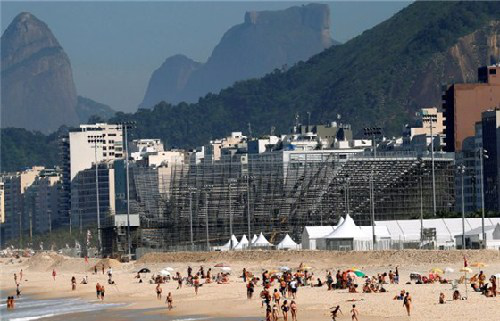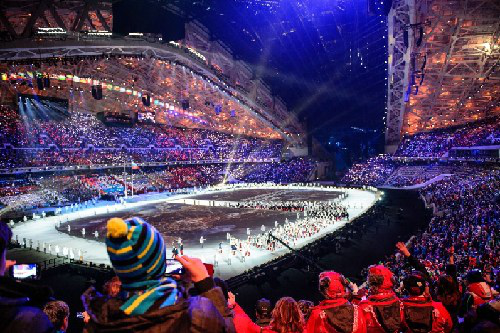托福阅读丨奥运会是否应该取消申办机制?
本届奥运会主办城市里约遭遇种种灾难和争议后,越来越多城市在问,“干嘛还要申办?”。至今为止,只有两届奥运会成功收回了成本,面对动辄500亿美元左右的投入,近十年的准备和大兴土木,很多城市开始犹豫这样的投资是否值得。今天的托福阅读栏目,长沙新航道小编就带大家看看。

Imagine you’re throwing a dinner party, but your guests—the ones who decided you should have the party—say they won’t come unless you make significant improvements to your entire home. To sell this undertaking, you tell your spouse and children that it really is time to have a larger, fancier house. You’ll probably host more dinner parties like this one at some murky unknown future date, even if you can’t afford the upgrade—which will cost many times more than estimated. Also, everything will be horribly delayed, and after the party, the extra space and most of the expensive improvements will go unused. At best, your neighbors consider you a cautionary tale. At worst, a punch line. This is what it’s like to be an Olympic host city.
For Rio de Janeiro, it’s much worse. Imagine all of the above, plus a plague of disease-spreading mosquitoes breeding in the oversize swimming pool you installed, which has gone to seed because you can no longer afford to pay the pool guy. Throw in a national recession, the worst in 100 years, plus a history-making political scandal and a global health crisis. Oh, and don’t forget the raw sewage in the sailing bay and the fecal matter on the beach-volleyball grounds, the crime wave, the swelling homeless population, and the bulldozed World Heritage Sites.
The Brazilian seaside jewel, the first South American city in Olympic history to play host, is a disaster. No, really: The city has declared a state of emergency, the kind normally declared during hurricanes and the like, as a way to collect federal funds to complete preparations for the Games. Very little about this particular disaster was natural, though. And apart from some bad luck, much of what has made it so could have been avoided—by never hosting the Olympics to begin with.
Of course, when the Games begin, the insanity of the host city’s decision will be, for two short weeks, if not celebrated, then at least momentarily pushed aside by the spectacle. People will move on with their lives, and Brazil will have wasted at least $15 billion on a new golf course, a subway line into a wealthy part of the city where everyone drives, and a $22 million gondola lift over a neighborhood that still lacks running water.
想象一下你要办个宴会,但是指定你办的客人们突然说,要是你不把全家里里外外好好收拾下,他们就不来了。为了达到要求,你跟伴侣和孩子说,换到更大更好的房子也不错。虽然因为花费巨大,你没钱继续装修,但没准将来什么时候还有机会接手更多类似的宴会。而且,过程中每件事都在延误,宴会结束后大量空间和昂贵的装修都会闲置。邻居们如果心存怜悯,会把你当成前车之鉴,如果刻薄点,你就是笑柄。这就是当奥运会主办城市的感觉。
里约热内卢的情况糟糕得多。想象一下上述情况全都发生了,再加上刚修好巨大游泳池里传播疫情的蚊子滋生,而且因为没钱付给维护的工人,泳池看起来一团乱。此外,巴西又遇上百年来最严重的经济衰退,史上最严重的政治丑闻,还有全球医疗卫生危机。哦,别忘了帆船海湾的污水和沙滩排球场上的粪便,犯罪潮,不断增加的流浪人口,还有遭破坏的世界遗产胜地。
巴西的海边明珠,也是座主办奥运会的城市里约真的遇到大麻烦了。真的,里约都已经宣布进入紧急状态,是一般只有碰到飓风之类自然灾害才会宣布的紧急状态。里约希望借这个由头申请联邦资金完成奥运会筹备工作。不过,这里的紧急状态跟真正的“灾难”沾不上什么边。除了运气有点走背字,大部分状况其实都是可以避免的,首先一条就是别去申请主办奥运会。
当然了,等到奥运会开幕,短短两个星期里人们会暂时忘记主办城市的纷乱一边,眼中只有瑰丽的盛会。待到曲终人散,人们回归正常生活,巴西会发现在新建的高尔夫球场上至少浪费了150亿美元;为富人区修好了地铁线,但这条路上人人都开车;架好了价值2200万美元的缆车线路,然而线路沿线的居民连自来水都用不上。

2014年在俄罗斯索契举办的冬奥会花费了510亿美元,大量设施工期延误,预算也严重超支
The infrastructure built for the Games is the most expensive aspect of hosting and often the greatest folly, but it has also become the standard rationalization for the high costs. Historically, cities earned quite a bit of revenue from TV rights, but the International Olympic Committee now takes at least 70% of that revenue; as recently as the 1990s it took just 4%. Ticket sales and the influx of tourists offer quick hits of cash, but in recent years that revenue has never come close to half the cost of putting on the Games—certainly not for Beijing (which spent $49.1 billion) or the Winter Games in Sochi ($51 billion).Rio, while spending comparatively little, will be paying for its infrastructure projects for another two decades. And from all evidence, it will see none of the revitalization of, say, Barcelona, which hosted in 1992 and is one of just two cities in the past half-century to make back what they had spent.
But in light of recent Olympic busts, the IOC’s tendency to be wowed by huge, purpose-built Olympic architecture has, perhaps, begun to backfire. While 12 cities bid for the 2004 Games, just five put in a bid for 2020. Only two competed for the Winter Games in 2022, and the citizens of Boston practically revolted over its potential bid for 2024. Now Rome appears poised to drop out of the 2024 running too. “Is the point of the Olympics to have a new city spend $20 billion every four years to build an ostentatious stadium they’ll never use again?” asks Andrew Zimbalist, an economics professor and the author of Circus Maximus, a book about the Olympics and the World Cup. “No! The point is to have an international sporting competition, for the world to come together and get over ethnic boundaries.”
One increasingly popular solution among academics and urbanists: Eliminate the bid to host altogether, and pick just one permanent host city. For the Summer Games, Zimbalist likes Los Angeles. It’s the only host (in 1984, its second run) to earn back what it put in within a year, and it has all the venues and infrastructure already in place. The IOC won’t entertain the notion, but if more cities start declining to shell out billions for useless stadiums, it might have to.
为比赛修建的基础设施往往是主办城市的花费,也是最愚蠢的部分,但是高花费已经成为常态。以前也有城市从电视转播权获得不少收入,但如今国际奥委会要拿走七成,上世纪90年代还只占4%。门票销售和游客能带来不少现金,但近年来这部分只弥补了不到一半的投入,北京奥运会(支出491亿美元)和索契冬奥会(510亿美元)都是这种情况。相较而言,里约花费少很多,但要做平基建项目的账也得20年。从现况看来,里约想学1992年的巴塞罗那一样收支平衡几乎不可能,巴塞罗那是近50年来两座成功收回成本的主办城市之一。
国际奥委会一向对大兴土木营造奥运场馆的城市格外偏爱,但随着主办城市亏损连连,奥委会开始自食其果。2004年奥运会还有12座城市申办,2020年奥运会只有5座城市竞争。2022年冬奥会仅有两座城市申办,波士顿人民直接否决了申办2024年奥运会的计划。如今罗马看来也要放弃申办2024年奥运会。经济学教授安德鲁·津巴利斯特质疑:“难道奥林匹克精神就是每四年选一座新城市,花上200亿美元大肆营建以后再也用不上的奢华体育场馆?不是!奥林匹克精神是举办国际体育比赛,跨越种族将全世界联系在一起。”
学界和城市学者圈里越发流行的看法是:取消申办机制,指定的主办城市。夏季奥运会方面,津巴利斯特最喜欢洛杉矶。1984年洛杉矶第二次举办奥运会,一年内就收回了成本,场馆和基础设施又都是现成的。国际奥委会肯定不希望这么干,但如果更多城市开始拒绝为没用的场馆砸钱,可能也会不得已而为之。

1984年洛杉矶奥运会。洛杉矶是过去50年里成功收回成本的两座主办城市之一
更多长沙托福培训相关资讯,请关注长沙新航道托福频道。新航道-用心用情用力做教育!!!

托福阅读 课程中心
查看更多 >托福快讯
- 这个问题是很多同学想知道... 2018-12-12
- 托福考试是同学们去国外留... 2018-12-12
- 语言成绩最终还是为申请学... 2018-12-10
- 相信每个学生都有一个... 2018-37-18
- 倘若美国常春藤的8所... 2017-22-27



